Buddhist Women on a Path of Spiritual Awakening
Giving To What We Love
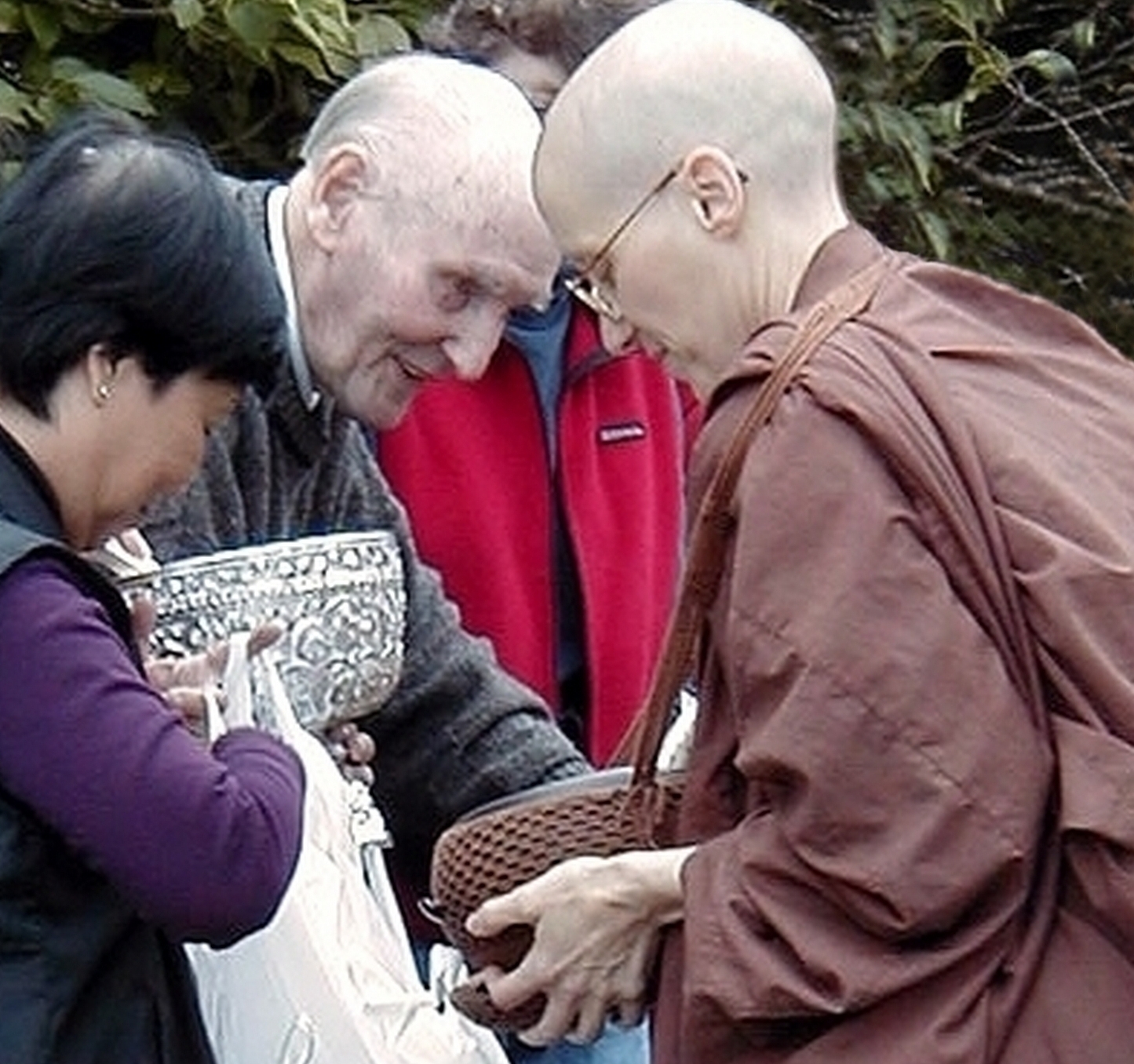
One morning, as I stood for alms in an outdoor market, an elderly man supporting himself with a walker shuffled awkwardly towards me. His daughter held him on one side with her arm. As soon as he saw my robe and bowl, and the shaven head, he let her go and, with palms pressed together, he made anjali, respectfully bowing his head and incanting the formulaic ‘Sadhu, Sadhu, Sadhu’.
Then, in wholehearted abandon, he began to pick fruit from a nearby vendor’s stall. At first he placed two apples into my alms bowl. Spotting a fancier variety, he set about selecting the choicest he could find. As he reached for the grapes, the shopkeeper intervened and motioned to him to hand over the fruit for her to wrap. But when she saw the cause of his excitement, she softened. For he was swept up in the devotion of giving and could not offer enough.
So effusive was his joy that he appeared to have forgotten his disability, his daughter, the fruit vendor and the protocol of the market. Beyond apples and grapes, the old man harvested the finest imported fruit with the urgency of one feeding a long lost friend – as if in that brief encounter he would offer all the generosity of his lifetime.
That kind of selfless generosity informs the power of my faith and renunciation. It acknowledges the sacrifice I make for what we both know to be true. And it nourishes my body and my heart. In the humbling that comes from walking life’s byways, powerless and content with little, I learn to trust giving myself to the unknown. And mysteriously, kindness provides for me.
Sometimes it is abundant, sometimes not, sometimes pleasant, at other times not. This is a universal predicament. None of us know what will come next and how we will respond – especially in this age of outrageous and unrepentant global violence. Though we may, for the most part, live with calm and confidence, until the mind is trained, sometimes all it takes is one grenade of a bad mood or internal ill-wind to blow before we are inundated by negative feelings.
As a mendicant, my happiness hinges upon the way I am able to bear not just physical rigors, but all the austerities of life. Whether I am praised or criticized, comfortable or challenged, calm or in despair, instead of following the bleak and destructive habits of the mind, I try to remember to be empty like my bowl, accepting whatever tightness of breath or furrowing of the heart may arise. And I use the mantra that everything is there to teach me. So as long as I am able to invoke gratitude for what is, I taste the unexpected benefit of being a beggar in the face of the present moment.
What this means is, whether I live in community or alone, I have to guard the mind constantly. We have all seen how easy it is to get rankled by an unforgiving remark or interaction that can swiftly erupt in reactivity – feeling good enough, not good enough, worthy, unworthy, proud or humiliated; or being disabled by a sense of vulnerability that loses mindfulness, denounces the situation, and broods over what’s lost or could have been.
A weak mind runs to thoughts of blame – outward or inward – instead of to thoughts of blessing. Whether from the crushing feeling of social pressure or the thrashing of the internal critic, the mind habitually retreats from pain, yearning for safety. And that safety is to be found nowhere else but in the silence of being with the way things are.
Again and again, I call on patient acceptance, unruffled resolve and perseverance as my allies in these seemingly irredeemable moments. Staying centered, aware, and clear, a benevolent wind wafts into my sail and calms the inner space enough to navigate my way back to serene and joyful presence. And the stamina to sustain that well-being develops by diligently letting go and not clinging to what is unwholesome and obstructs mental clarity, peace and wisdom.
Ultimately, the trust with which I give myself to the unknown moment comes from a heart that is open and willing to surrender. It is a generosity of spirit that enables me to move out of complacency and take risks. This quality of giving must renounce any trace of selfishness. It can be neither smug nor self-congratulatory. It is asks nothing in return, like the elderly man in the market who so caringly fed me, a complete stranger. But he recognized the beggar, dressed in the robe of the Buddha.
Such unconditional generosity springs from and feeds a transcendent joy. For in giving to what we love and respect, we nourish the goodness in ourselves. And it is mutual. I become – for the giver, as well as for myself – the fourth of the Heavenly Messengers, a renunciant.
My aging body and the illnesses of recent years serve to remind me of the first three of these messengers – old age, sickness and death. And in the frailty of his advanced years, my old benefactor also acts as their herald – more potent for the way he overcame even physical dysfunction by the ardour of his faith.
Devoted to this work of emptying and opening the heart, the fruits we taste, like the joy of offering and receiving, are greater than those of the earth. They are indeed heavenly – beyond pain, beyond death.
© Ayyā Medhānandī
Posted in a 2006 series of blogs that appear under ‘Penang’s’ blog on the ‘Teachings’ page.
After A Millenium – Venerable Kusuma Bhikkhuni
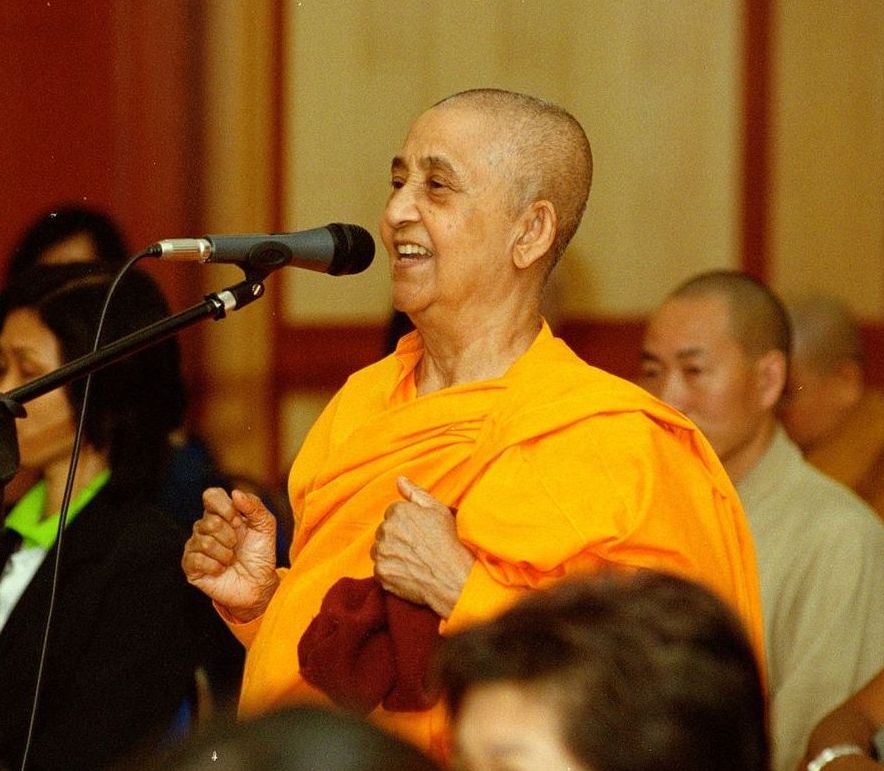
On Aug. 28th, 2021, Venerable Dr. Bhikkhuni Kusuma Mahatheri passed away peacefully in Sri Lanka. She was 92. Her doctors marvelled to witness such a peaceful death. We marvel at the gifts of her life.
Venerable Kusuma Bhikkhuni was internationally respected as a Buddhist monastic, scholar and teacher. We remember her and honour her remarkable service to the Buddha Sasana and, especially, her pioneer work for the restoration of bhikkhuni ordination in Sri Lanka after a lapse of 1000 years.
Profoundly devoted to the Buddha’s teachings, she was a loving mother and grandmother; a graduate in molecular biology in the United States; and a university professor of science and English. She also completed two doctoral degrees in Pali and Buddhist studies and established the Ayya Khema Meditation Centre in Sri Lanka, named for her beloved mentor. She authored numerous books, represented Sri Lanka at international Buddhist conferences, and, even into old age, she continued to travel throughout the world to teach the Dharma.
For all her early academic research, Venerable Kusuma Bhikkhuni’s fervent questions about the nature of existence were only resolved through her study of the Buddha’s teachings. Inspired by the ordination of the Buddha’s mother, Mahapajapati Gotami, and the verses of arahant bhikkhuni disciples of the Buddha, she travelled to Korea and Taiwan where she could experience living female Buddhist monastic lineages. In Sri Lanka, she advocated fearlessly for the uplift of female education and full ordination in the face of vitriolic opposition from the conservative Buddhist clergy.
At last, in 1996, she was able to formally take her own higher vows as the first of ten Sri Lankan candidates in a dual ordination ceremony in Sarnath, India. This historic ceremony simulated the ancient ritual for female higher ordination prescribed by the Buddha himself more than two and a half millenia ago. It was conducted by a united Sangha of elder bhikkhus from the Mahā Bodhi Society of India as well as elder bhikkhus and bhikkhunis from Korea, thus rekindling the Bhikkhuni Sangha for modern day Theravada Buddhism.
At its helm stood a lioness of a woman, Venerable Kusuma Bhikkhuni – courageous leader, compassionate Dharma mother, and stellar role model – particularly for bhikkhunis and women the world over. She embodied the noble qualities of a modern day Mahapajapati, blessing us with an indelible Dharma legacy for generations to come.
The Wiser Your Heart
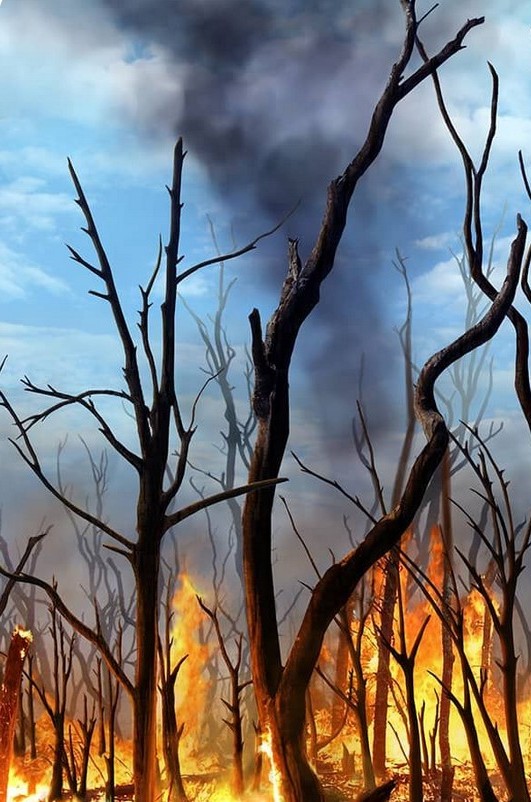 Study the nature of change
Study the nature of change
as if your life depends on it.
(It does)
The more you understand impermanence
the lighter your step
the sharper your gaze
on your path
through the fleeting world.
Study uncertainty
as if your life depends on it.
(It does)
the more you understand ‘maybe’
the more ‘maybe not’
the freer your limbs
the more apt you’ll act
more apt respond
on your path
through this uncertain world.
Study causality
as if your life depends on it
(It does)
The more you understand the conditions
the wiser your heart
the deeper your gratitude
for the guides on your path
through the suffering world.
Ajahn Jayasāro 07/08/2021
Eclipse of the Heart

Have you ever watched a full solar eclipse? When the moon slips mysteriously across the face of the sun and obliterates it from view, the light of day grows pallid, burnishing all the world with its eerie luster. As the air temperature cools, birds and insects react strangely. Dairy cows suddenly huddle together near their barns while sunflowers and many other kinds of plants turn their heads, leaning towards any residue of light in the sky.
In the premature dusk of a full solar eclipse, all manner of living creatures act as if it were night. And then light is swiftly restored to them. However, during an eclipse of the human heart, light may not come so easily.
While day bows to night, like all the creatures, we too are subject to becoming frail and insecure. But for us it might be in a lingering way. When anxiety and depressive states invade the mind, they endanger our equilibrium. Whether we suffer a minor storm of the heart or a full-blown life crisis, we may fail to see that our mental health is at risk. Our world is as if turned on its head and the confidence that once coursed through us plummets.
We may feel broken, lost, blinded, dazed, or disoriented; or a constellation of these disabling emotions, losing all sense of clarity or happiness. We are in danger of harming ourselves or others. Perhaps we try to simulate the way the creatures turn themselves towards the sun but lack the knowledge to do so.
Unlike the swift passing of an eclipse, restoring light and healing to the mind needs time, care, commitment, courage and robust faith in the power of the Dhamma. Are we ready to undertake a life-changing spiritual healing that will transform our suffering into compassionate understanding? Let’s say yes! If we realize the nature of suffering, it’s origin, and that we do not own it, then we can let it go. Letting go, we no longer suffer. To pursue such a path without giving up – that is the test.
How to begin? First and foremost, brighten the mind with the joys of generosity and moral restraint in our conduct and speech. We set our compass to kindness as our ‘true north’. These are quintessential to stay on course for the long, long journey.
Awareness is certainly key. But when we feel powerless and are swept along by sadness, regret, anger, fear or mistrust, we are often trapped in a cloud of negativity. We can even be rendered dysfunctional when a troublesome incident or affliction plagues the mind and obsesses it for days, months, or even years.
So, we are called upon to develop a deep sense of trust within our own awareness. Can we be like a gardener? We will seed and keep cultivating essential qualities such as resolving to be patient, to be content with little, and to be grateful for the practice itself rather than striving for results. Gradually they will come but, in this project, we need to throw away the yardstick.
As we nurture faith, it develops into an inexhaustible confidence. We know this way of practice is true medicine for our illness. Trusting further, stay with being aware and observing the eclipse process itself. See the feelings arising and falling away again and again. Repeatedly focus on the breath, for example, and be completely present as much as possible. This will be a tonic for us.
It may not be sustainable at first. So we persevere tirelessly, training ourselves to keep noticing these patterns. Learn how to stand back, observe, and stay on healthy ground from which to directly observe our experience. Imperceptibly, we become adept – as with any skill or profession. Again, patience with the process serves us mightily. We are learning to stop, to be still, and to see.
We are also gaining vantage and perspective that inject us with a secure footing. Inwardly stable, we appreciate what is happening at an atomic level. Now we can do this safely centred in the mind as it learns to rest within itself.
Rooted in trust, mindfulness grows. This, in turn, increases our energy. We focus attention more intensively to investigate the feeling of being afraid. And we begin to see something new, a revelation not previously understood. We see fear for what it really is.
It is no small miracle to realize that awareness of fear is not as enervating as feeling fear itself. We have learned how to attentively observe sensations in the body associated with difficult feelings of anxiety. Now we use that same way of gaining perspective to sit our ground and observe fear rather than being identified with and enveloped in the fog of fear.
To stand apart from fear and know it empirically from within the heart is groundbreaking. Can we see that we are not that fear? Awareness of fear and the feeling of it are distinct. Continue to observe in this way – not just fear – but all the permutations of feelings, sensations and moods in the mind. Repeating these ways of self-study again and again countless times is restorative. In time, these very insights invite the radiant light of wisdom to be directly experienced.
Through the lens of astute awareness, refine this posture of witnessing our experience. Notice unpleasant feelings and pleasant feelings and how the mind moves out of the grip of either one. That’s when it’s possible to understand them best, to see how we cling and how to detach so that we develop equanimity with the process – rather than spinning or reacting. We are tasting freedom from fear. The heat is buffered. It is cooled.
During a solar eclipse, the moon covers the sun. We watch and it travels on. The sun reappears and light is restored. So it is when awareness prevails over feeling. Just as a ray of light heralds the dawn, awareness surpasses our fear and invites a reversal of darkness.
By and by, we teach ourselves how to empty the rubbish in the mind more adeptly. And so, we sit in awareness with a greater sense of ease and calm. We must also learn to sustain it in the face of inner or outer storms, painful experiences, or other inclement conditions.
With pure awareness here and now, having observed feelings of fear or pain in their true light, we know what they really are. Directly seeing all that we experience in the body and mind naturally appear and fall away again, we penetrate beyond our individual feeling of fear to realize its three universal characteristics.
The first is impermanence. The ever changing quality of that feeling, and thereby all that we experience, is also understood as intrinsically unsatisfactory. Like every feeling, it is fleeting – and in the clock of moments, it will arise and pass away again and again – with an indeterminate momentum beyond our control. We have no ownership of either painful or pleasant experience. Once observed in this way, its grip on the mind should ease.
More importantly, we see that it has no owner. It is empty. Extending this insight to all experience teaches us that all is empty. We find no evidence of a self in any experience. Seen for what it is, dissolving in a moment and forever gone – even if it arises again – that will be a new moment, a new feeling, albeit a facsimile of what preceded it.
These aspects of our experience are to be known from the inside. They are as if forged from the core of our core thanks to wise intuitive reflection on what we truly see, and what results from that seeing. We intuitively understand the difference between what we are aware of and awareness itself.
Stilling the mind more and more, the inner quiet matures. We enter a dimension that fuses all objects of consciousness until we can longer differentiate them. Gradually, the awareness of the mind emerges to engulf all that we are aware of. The mind appears vast like the sky – boundless, empty but clear. At this moment, we are aware of awareness itself.
Practising awareness of awareness may seem ambitious and subtle but we can make that step. It is a momentous option that opens the gate. We try it on, develop it, grow it, expand it thoroughly, and sustain it as much as we can. In every waking moment, we bring attention to this new engagement – the mind knowing the mind.
Incrementally, we are moving beyond the state of eclipse. Alert and aware, the mind grows joyful and at ease. As we let go worry and stress, the present moment becomes our resting place, our recourse from the crush of the world. And we can continuously return to it. We are free, present, aware and able to sustain that unique clarity of pure awareness – regardless of what objects appear and fade away in the domain of the mind.
To be able to look directly at the solar eclipse, we need UV protection. To know the truth of the Dhamma directly, we need intuitive awareness of the mind and wise reflection to reveal its inner light. We reverse the darkness of ignorance, just like the moon completing its passage across the face of the sun.
Then we open to a noble dimension of experience, the mind seeing itself – unsullied by worldly concerns and trappings. We see its pure, stainless radiance in the heart of our heart. And in every heart. Within that interior peace, wisdom ripens. We are on the path. We are truly waking up.
Ayyā Medhānandī
Vulnerable But True
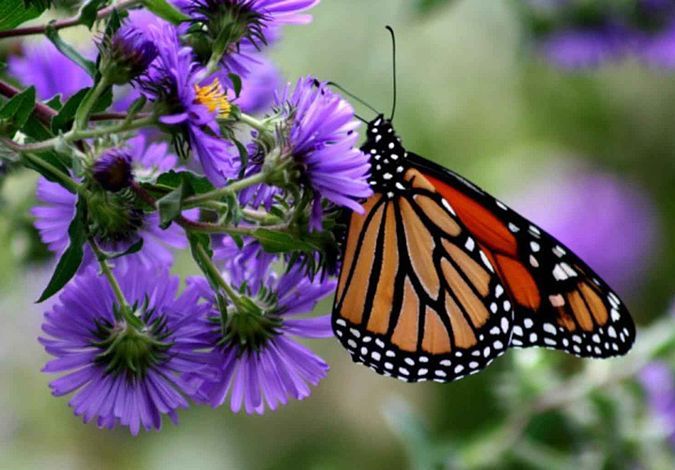
Too scared to let go
Reckless in what is fearsome
Deluded, we cling to false freedoms
To delusion itself.
The monarch’s epic pilgrimage
Is fearless
We too are stronger than we know –
So, sip the nectar of this moment
Vulnerable but true.
This world is populated with countless views about everything, including how to be free, and how to let go, and what it is that we wake up to. So ‘who’ is right? And what is this ‘who’ that is empty of any substance?
Delving deeply, we realize that we are not the body, not the mind, nor any of these mental and physical phenomena. So let us not cling to the vacuous views, opinions, attitudes about or by a self or selves, and all their fabricated characteristics. When what we hear about the teachings and techniques fails to ring true for us, then look inward.
See how things are and what they are. Stay within, intuitively aware of our own reality. Clearly and directly know the impermanent, imperfect and impersonal nature of it. Observe with patience, care and devotion. As we forgive conditions, again and again, the path gradually opens for us. We are trainees and we stay with what is present right now, supporting the uprising gifts of insight.
We are on a path, and we persevere faithfully to stay on it. Mere ideas about the goal and the results of the journey can dissipate our energy, distract us, and lead us astray. So let us focus on our commitment to the Path and the revelations that come not by thinking about walking it with our own feet but by actually doing it – conscientious and contemplative.
The Buddha’s younger cousin, Nanda, became a monk just after being wed to a beautiful princess. Infatuated with her, he could enjoy no spiritual happiness. The Buddha came to know this through his psychic powers, and took Nanda on a trip to a heavenly realm where he saw magnificent celestial nymphs that far surpassed the beauty of his betrothed.
The Buddha was truly wise. Understanding the frailty and potential of human nature, he promised those nymphs to Nanda if he kept up his meditation practice. The other monks ridiculed Nanda for his mundane aspiration. Nevertheless, the promise of those divine nymphs fired up his zeal enough for him to focus on his practice and he soon became an arahant. He realized the Deathless.
Purifying our actions, speech, and thought habits, and researching the states of the mind – these are the Path. Whereas being critical towards others because of their views about waking up or where the path leads is not the Path, is not the Deathless. It is more of an obstacle for us than what anyone might think or say about the goal of the holy life.
A junior astronaut may want to know what it feels like to be in space before ever going up into space. You can’t know until you sit in a rocket and blast off. Then you can really know. You feel the weightlessness, you embody the experience of it. Before going into space, you do all the preparations for it and then set out on the journey to find out for yourself.
So it is with treading this Noble Eightfold Path. No one can walk it for us. We have to walk this path one foot in front of the other, consciously taking in one breath upon the other, until we realize the Truth where this path leads. It only leads in one direction, to the sacred – right here within our own visceral experience.
Then we know for ourselves what is real and what is not, what is true and what is not. With the Buddha as our supreme incomparable mentor, we follow the Dhamma he taught, keeping the Buddha, the Blessed One, in the forefront of consciousness, as our best friend, teacher, guide and refuge.
Trust the Buddha. Trust the Dhamma. Trust the Noble Sangha who have completed this path. We follow them – alone but courageous, vulnerable but true.
Actually, we are always alone even when we are with others. And yet, spiritual friendship is a must for this work to strengthen our inner seclusion. So choose spiritual friends, guides, teachers, and spiritual community according to what resonates for you – with discernment and, necessarily, with consummate compassion and tolerance that can overcome all forms of our ignorance such as greed, ill-will, aversion and fear.
Insights gained from a technique are but frail without consummate compassion. Wisdom, yoked to compassion, helps us to hone our practice not through our concepts about the goal or our expertise in a particular technique, but according to what we excavate and learn from within.
We are students of the moment, of the breath, of the sufferings held in the body – examining everything that arises for us, and refining how we live and practise all eight limbs of the Path, namely right view, right intention, right speech, right action, right livelihood, right effort, right mindfulness and right concentration.
There could be a million views about how to wake up. This should not concern nor distract us. We stay in the middle, wary of attachment to views – our own or those of others. And wary of attachment to opinions, to judgments; to the ever-emerging mental fabrications that are subtly critical attitudes.
If we want others to be perfect, turn the mind instead to here, now. Where right view brightens into a clarity from within – not from anywhere outside of us – that is the seed of compassion for all beings, as to ourselves.
Otherwise we become stuck in wanting, believing in, and seeking perfection in the world – both the world of ideas and the outer world, or in the body. That is not possible. Why? Because “all that has the nature to arise, has the nature to cease”, and is not ‘me’ nor ‘mine’ to control. Nothing of the world is permanent, therefore it cannot be perfect.
Stay grounded with things as they are and know that true perfection is realized in clearing the heart-mind. Then the heart grows quiet. It touches all – encompassing all – never moving away from anything or anyone.
So may you follow the Way of the Dhamma with joy and ease. The whole world is in your heart.
Ayyā Medhānandī
Higher Mind
 from the Ten Perfections (pāramī) by Ajahn Sucitto:
from the Ten Perfections (pāramī) by Ajahn Sucitto:
Generosity/Sharing (dāna): Recognizing the joy of sharing, and acknowledging that we all come into this world subject to pain, sorrow, sickness and death, I aspire to offer what I can in terms of resources, hospitality, healing and wise advice.
Morality/Integrity (sīla): Recognizing the trust that develops from conscientiousness and fellow-feeling, I aspire to cultivate actions of body, speech and mind that turn away from hostility and harshness, and that cut off greed and manipulative behaviour.
Renunciation/Values-based Simplicity (nekkhamma): Recognizing the ease that arises with modesty and contentment, I aspire to relinquish needless acquisition and an imbalanced use of material resources.
Clarity/Wisdom (paññā): Recognizing the skill of clarity, I aspire to handle my perspectives with awareness and careful reflection, and thereby arrive at an unbiased understanding.
Energy (viriya): Recognizing my capacity for vigour, or for distraction and laziness, I aspire to use my energy for my long-term benefit and for the welfare of others.
Patience/Tolerance (khanti): Recognizing the value of tolerance and perseverance, I aspire to let go of getting my own way, cutting corners and being narrow-minded.
Truthfulness (sacca): Recognizing the wise relationships that can be established through my own veracity and through the honesty of others, I aspire to free my mind from biased perspectives and devious behaviour.
Resolution (adhiṭṭhāna): Recognizing the potency of a firm heart, I aspire to hold intentions that are enriching, and to ward off vacillation on one hand and forceful goal-seeking on the other.
Goodwill (mettā): Recognizing the happiness of a warm heart, I aspire to cultivate empathy and compassion. Resisting mind-states based on fault-finding of myself or others, I will encourage goodwill rather than foster ideals of perfection.
Equanimity/Stability of Heart (upekkhā): Recognizing the peace of even-minded acceptance, I aspire to let sickness and health, blame and praise, failure and accomplishment flow through my awareness without getting distracted by them.
from Buddha-Nature, Human Nature, Amaravati Publications, 2019
Fearless in the Good
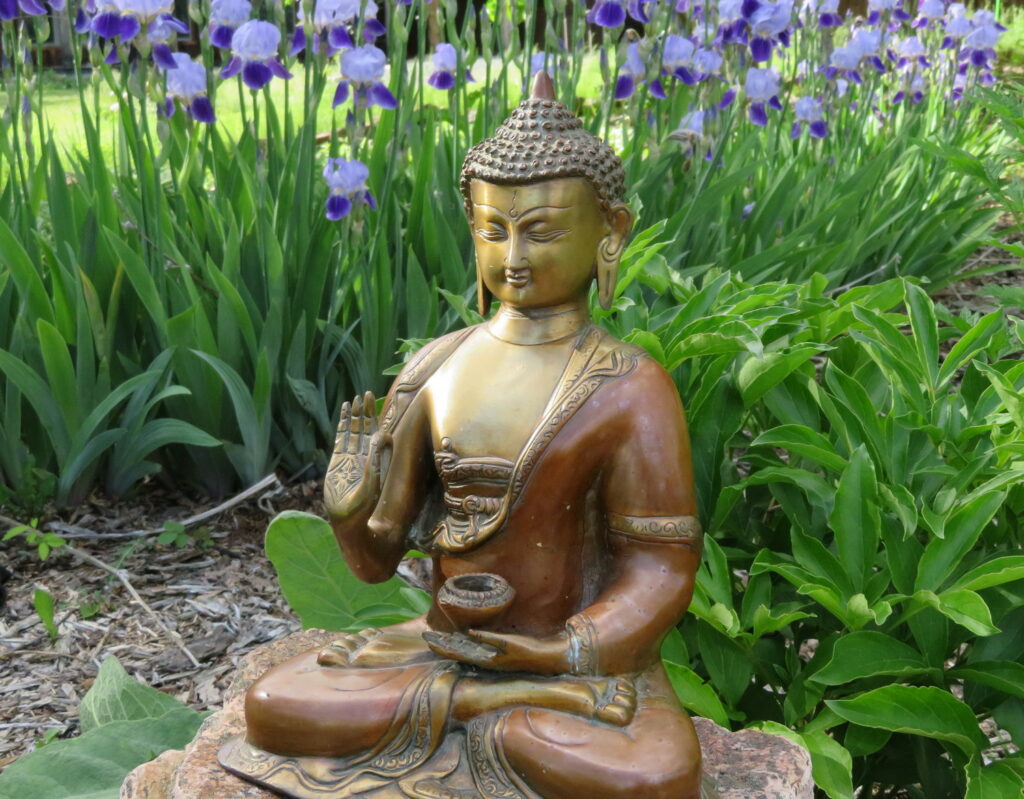
The Buddha asked King Pasenadi to reflect, “What if one of your trustworthy and reliable scouts came running to you from the east and said, ‘I have just come from the east and there I saw a great mountain as high as the clouds coming this way, crushing all living beings. Do whatever you think should be done, great king.’ Then a second scout came from the west, and a third from the north, and a fourth from the south, and they all said the same thing about the direction from which they had come.”
The Buddha then asked, “If such a peril should arise, such a terrible destruction of human life, the human state being so difficult to obtain, what should be done?”
King Pasenadi replied with great respect to the Buddha, “Bhante (venerable sir), if such a great peril should arise, such a terrible destruction of human life, what else should be done but to live by the Dhamma, devoted to non ill-will and non harm (dhammacariya), to live devoted to spiritual calm and peace (samacariya), and to live devoted to goodness, doing kind and generous deeds (kusalakiriya and puññakiriya).”
Then the Buddha replied, “I inform you, great king, I announce to you great king, ‘aging and death are rolling in on you’. When aging and death are rolling in on you, great king, what should be done?”
And once again King Pasenadi replied, “As aging and death are rolling in on me, Bhante, what else should be done but to live by the Dhamma, devoted to non ill-will and non harm, to live devoted to spiritual calm and peace, and to live devoted to goodness, doing kind and generous deeds.”
The Buddha reminded King Pasenadi that people, particularly kings, are obsessed with wealth and power and fame and getting one pleasant sensory experience after another, even at the cost of others.
But, to modernize his analogy, the king is reminded that no army nor government – no matter how large; no health care system nor vaccine – no matter how great; no riches – no matter how grand; no attitude of superiority due to skin colour, culture, language, gender or sexual orientation has any place or any scope when aging and death are rolling in.
Once again, the king replied, “There is no place or scope for any of these when aging and death come rolling in. As aging and death are rolling in on me, what else should be done but to live by the Dhamma, devoted to non ill-will and non harm, to live devoted to spiritual calm and peace, and to live devoted to goodness, doing kind and generous deeds.”
The Buddha consented, “So it is, great king! So it is, great king! As aging and death are rolling in, what else should be done but to live by the Dhamma, devoted to non ill-will and non harm, to live devoted to spiritual calm and peace, and to live devoted to goodness, doing kind and generous deeds.”
May we all find value in the Buddha’s message to this great king and in the king’s wise response, and, no matter what comes rolling in, may we set our compass towards love, kindness, goodness and deep and lasting peace.
No Goodness Is Ever Lost
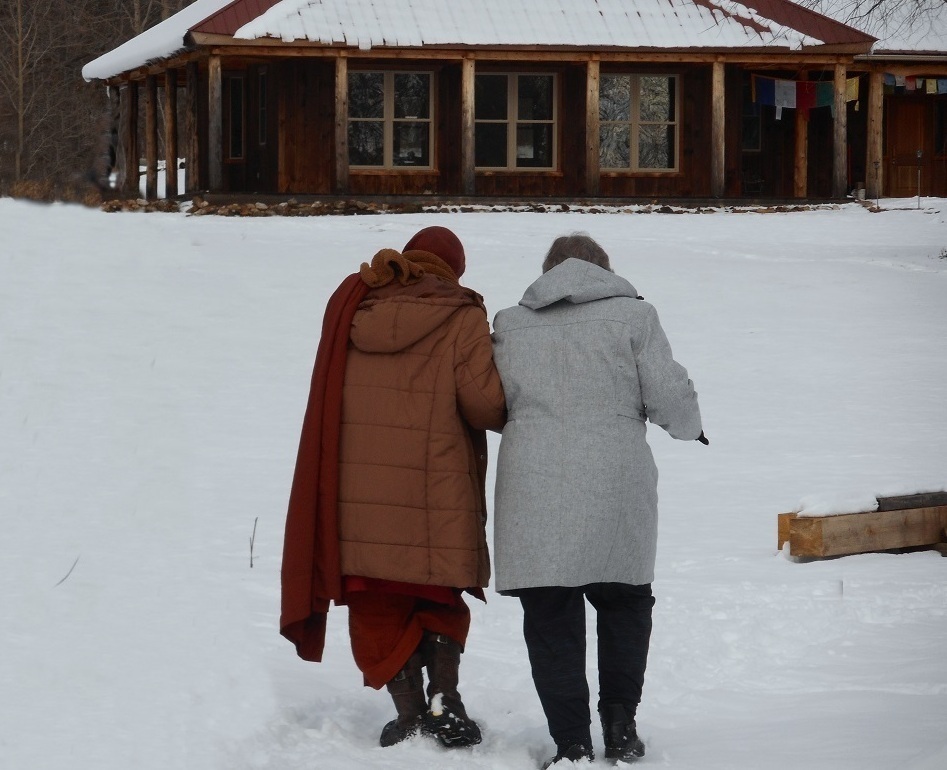
A reflection from Ajahn Jayasāro:
For most people, reaching the end of their life, breathing becomes laboured. Meditation on the breath, even for experienced meditators becomes difficult. At this crucial time, with death approaching, the meditations that are most practical are those that use the power of recollection to stimulate uplifting emotion.
Once kindled, that emotion can become the meditation object. If the mind starts to waver, then the meditator is encouraged to return to the original recollection in order to rekindle the emotion. Wholesome emotion, systematically cultivated in this way, can take the mind beyond the hindrances and into samādhi.
The most powerful of these meditations is the recollection of the good deeds that one has performed throughout one’s life. When we recall occasions on which we acted kindly and purely for the welfare of others, with no desire for any kind of reward, we feel an immediate sense of well-being. This is true even for good actions performed many years ago.
To realise that such a source of joy and peace lies within us is a wonderful discovery. We come to understand that no goodness is ever lost. Every kind action we have performed has added to the store of ‘noble treasure’ within.
Sati Saraniya Hermitage Podcast
We started publishing select Dhamma talks through a Sati Saraniya Hermitage podcast. New episodes will come out every Friday and you can get notified about these by subscribing to an update email from Mailchimp (make sure that you check “Sati Saraniya Podcasts” option) or by using your favourite podcast app. We are listed in the following directories: Blubbry, iTunes, Google Podcasts, Spotify, and Stitcher. For custom software, you can also use this RSS feed.
You can also listen to recent talks on our teaching’s page where you can search through a collection of Dhamma topics. Please let us know if you encounter any issues.
Four Kinds of People
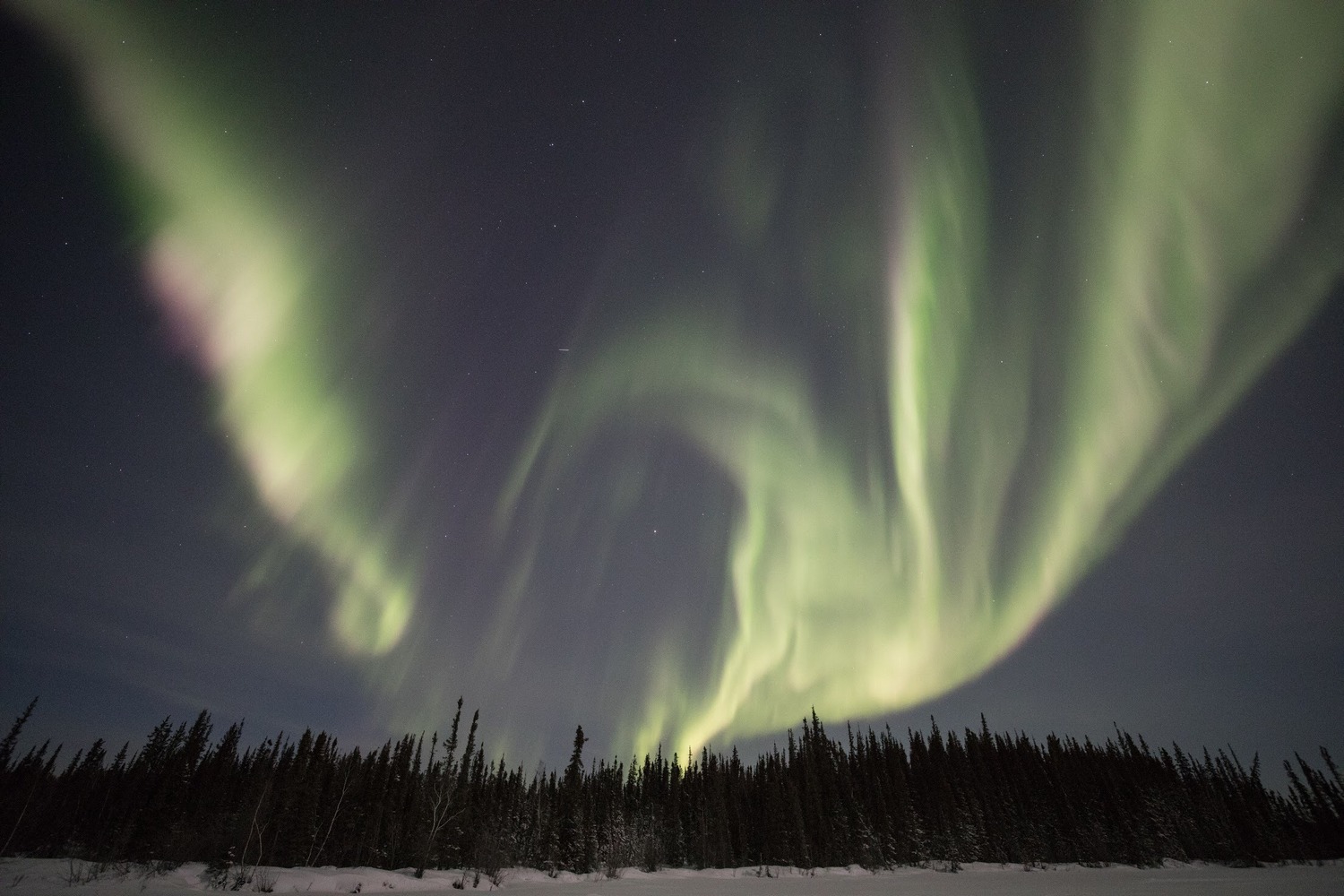 While reading the news of current world events, I am reminded of one of the Buddha’s teachings on different kinds of people in the world. On a certain occasion the Buddha said, “There are four kinds of people found existing in the world. What four? One in darkness who is heading for darkness, one in darkness who is heading for light, one in light who is heading for darkness, and one in light who is heading for light.” Tama Sutta: Darkness, AN 4:85
While reading the news of current world events, I am reminded of one of the Buddha’s teachings on different kinds of people in the world. On a certain occasion the Buddha said, “There are four kinds of people found existing in the world. What four? One in darkness who is heading for darkness, one in darkness who is heading for light, one in light who is heading for darkness, and one in light who is heading for light.” Tama Sutta: Darkness, AN 4:85